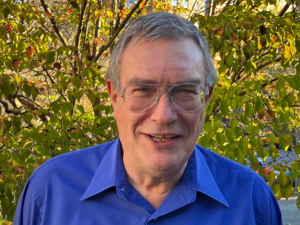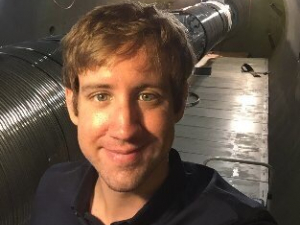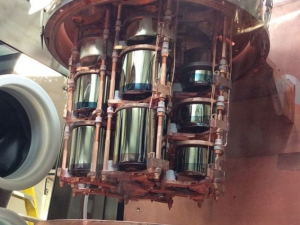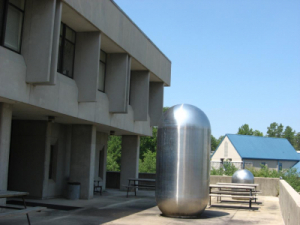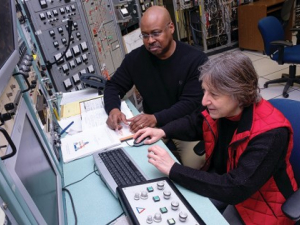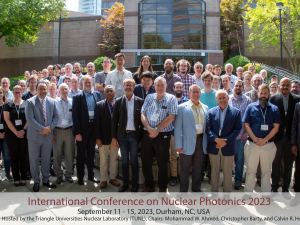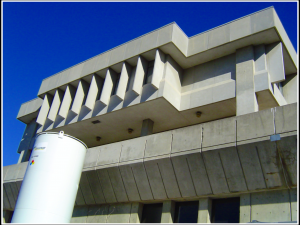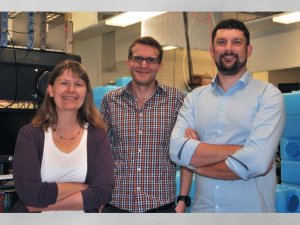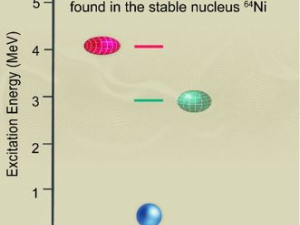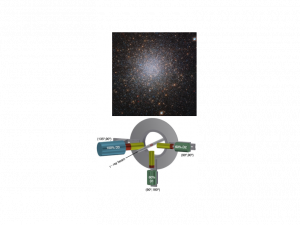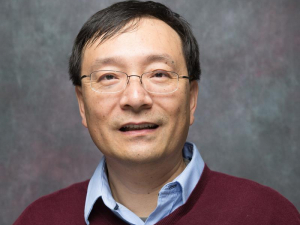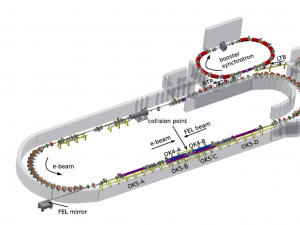The promise of fusion energy rides on the unusually large deuterium-tritium (DT) reaction rate. Deuterium and tritium—heavy isotopes of hydrogen—fuse to release energy, and DT fusion is not only the basis of the hydrogen bomb, but has also been the leading candidate for practical reactors like Tokamaks, for example. In 1955, Edward Teller credited Emil Konopinski with first recognizing this at Oppenheimer’s 1942 Berkeley conference. A team of researchers from Los Alamos and TUNL have traced the origins of this insight even… read more about TUNL Researchers Recreate Historic Fusion Measurement »
The TUNL REU Program is now accepting applications for the 2025 Summer Program. The program dates will be May 18 - July 26, 2025. To learn more about the program and access the application portal, please go to: https://tunl.duke.edu/education/reu read more about Application Portal for the 2025 TUNL REU Program Now Open »
TUNL faculty member Akaa Daniel Ayangeakaa has been promoted to the rank of Associate Professor with tenure within the Department of Physics and Astronomy at the University of North Carolina at Chapel Hill. Professor Ayangeakaa’s research is focused on understanding how nuclear shapes evolve on both the proton- and neutron-rich sides of the nuclear chart, and quantifying the impact of this evolution on nuclear structure properties. His research takes place at the local HIGS facility as well as off-site at… read more about Akaa Ayangeakaa Promoted to Associate Professor »
2022 Duke University and TUNL graduate, Sam Hedges, has been awarded the Springer Thesis prize for his dissertation entitled "Low Energy Neutrino-Nucleus Interactions at the Spallation Neutron Source". Sam did his research under the direction of Duke faculty member, Phil Barbeau, and is now a postdoctoral fellow at Lawrence Livermore National Laboratory. As part of the prize, Sam's thesis will be re-published as a book and e-book in the Springer Theses series. This series brings together a selection… read more about Springer Thesis Prize Awarded to TUNL Graduate Sam Hedges »
The application portal for the 2024 TUNL REU Program is now open. Click here to access the portal. The 2024 Program will be the 25th for TUNL and we plan on commemorating the occasion throughout the summer. The tentative program dates will be May 19 - July 27, 2024. read more about Application Portal for the 2024 TUNL REU Program Now Open »
On October 4 2023, the Nuclear Science Advisory Committee (NSAC), a federally chartered advisory committee to the U.S. Department of Energy and the National Science Foundation, announced the new long-range plan (LRP) for nuclear science entitled “A New Era of Discovery”. This LRP articulates “the scope and the scientific challenges of nuclear physics today, what progress has been made since the 2015 LRP, and the impacts of these accomplishments both within and outside the field.” The LRP provides a framework for coordinated… read more about TUNL Hosts Event for Nuclear Science Long Range Plan Release »
The U.S. Department of Energy Office of Nuclear Physics has chosen NCCU to receive a Reaching a New Energy Sciences Workforce (RENEW) initiative award. The NCCU grant is about $2 million over 5 years and will be led by faculty members Diane Markoff (PI) and Ben Crowe (co-PI). This award supports a new faculty member at NCCU to participate in experimental accelerator-based nuclear physics at TUNL under the mentorship of faculty from any of the member institutions. In addition, the award supports a post-baccalaureate program… read more about NCCU Receives Grant for Accelerator-Based Research at TUNL from DOE NP-RENEW »
The Fourth International Conference on Nuclear Photonics was held September 11 – 15, 2023 in Durham, North Carolina, USA. Nuclear Photonics 2023 is part of a series of biennial conferences devoted to the pursuit of nuclear science and applications with photons. The conference was organized by the Triangle Universities Nuclear Laboratory (TUNL), which is a research consortium of Duke University, North Carolina Central University, North Carolina State University, and The University of North Carolina at Chapel Hill. … read more about 4th International Nuclear Photonics Conference Hosted by TUNL »
The Fourth International Conference on Nuclear Photonics will be held September 11 – 15, 2023 in Durham, North Carolina, USA. Nuclear Photonics 2023 is part of a series of biennial conferences devoted to the pursuit of nuclear science and applications with photons. The conference is organized by the Triangle Universities Nuclear Laboratory (TUNL), which is a research consortium of Duke University, North Carolina Central University, North Carolina State University, and The University of North Carolina at Chapel Hill. … read more about TUNL to Host 4th International Nuclear Photonics Conference »
Congratulations to TUNL Director, Bilpuch Distinguished Professor Robert Janssens, for receiving this year's Division of Nuclear Physics Distinguished Service Award! The citation reads: "For his exemplary service to the DNP, particularly his extended leadership in the chair line and the nuclear physics community, including as the Director of the Physics Division at Argonne National Laboratory and as Director of the Triangle Universities Nuclear Laboratory." read more about Prof. Janssens Receives DNP Distinguished Service Award »
In a study recently published in Physical Review C, a team of researchers from UNC and Duke, led by UNC graduate student David Gribble, investigated excited states of 40Ca and 11B at level energies between 8 and 9 MeV, using the High-Intensity γ-ray Source (HIγS) at the Triangle Universities Nuclear Laboratory (TUNL). Levels in the 11B nucleus are interesting because they often provide energy and efficiency calibrations for NRF experiments, while excited states in the 40Ca nucleus are important for estimating reaction rate… read more about TUNL Researchers Publish New Precision Study of Astrophysically Relevant Ca-40 and B-11 Nuclei »
Ying Wu, Professor at Duke University and Associate Director for Light Sources at TUNL, is the co-winner of the 2022 FEL prize as announced last week during the 40th International Free Electron Laser Conference (FEL2022), held in Trieste, Italy, from August 22th to August 26th, 2022. The citation for the prize reads as follows: "Prof. Wu has made important contributions to both theoretical and experimental FEL science. He has distinguished himself with the use of storage… read more about Prof. Ying Wu Receives 2022 FEL Prize »
TUNL is receiving a $1.5 million award from the Department of Energy to upgrade its beam-injector system. The current direct extraction and helium ion sources with be replaced with a Toroidal Volume Ion Source (TORVIS) from National Electrostatics Corporation. The TORVIS will provide high currents of hydrogen, deuterium, and helium negative ions which can then be injected into TUNL's FN tandem van de Graaff accelerator. A Source of Negative Ions by Cesium Sputtering (SNICS-II) is… read more about TUNL Receives $1.5 Million DOE Award »
TUNL Faculty Member, Dr. Mohammad Ahmed, has been appointed as Dean of the College of Health and Sciences at North Carolina Central University (NCCU) in Durham, effective July 1, 2022. Dr. Ahmed is currently a Professor of Physics and Mathematics at NCCU and an Associate Director at TUNL. His research is in the field of low-energy quantum chromodynamics and is performed primarily at the HIGS facility. More information on his appointment can be found here. read more about Dr. Mohammad Ahmed Appointed NCCU Dean »
TUNL is excited to welcome a large class of undergraduate researchers for the summer. Twelve students are participating in the NSF-sponsored TUNL REU Program which has been running continuously since 2000. Six students are part of an inaugural class of DOE-sponsored Traineeships in Nuclear Physics being run by NCCU with mentors from all the TUNL consortium institutions. In addition there are undergraduates from Duke, UNC, and NCSU participating in research with TUNL faculty this summer. All of the… read more about TUNL Welcomes Undergraduate Researchers »
Both the tandem and HIGS accelerators are in full operation. Please contact us to get updates about access and operations before visiting. read more about TUNL Operations Update »
In November 2021 we are celebrating 25 years of gamma rays at the High Intensity Gamma-ray Source (HIGS), which is housed in the Duke Free Electron Laboratory. The HIGS facility supports frontier photo-nuclear research and is the highest-flux Compton gamma-ray source in the world, generating polarized gamma-ray beams with energies from 1 to 100 MeV. read more about 25 Years of Gamma Rays at HIGS »



